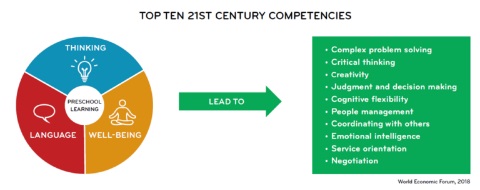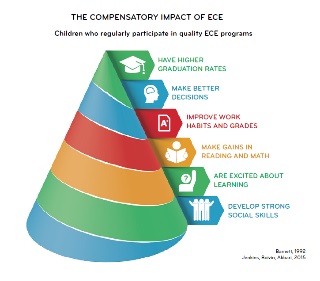"Instead of a place kids go while mom works', today's early childhood education provides a first tier of education that is as important as those that follow" (Margaret McCain, 2020)
Much of the recent talk about childcare has focused on the economic benefits to parents, to women, and to the economy at large. While there is no question that access to affordable early learning and childcare programs allows greater participation in the workforce - which will in turn contribute to Canada's economic recovery coming out of the pandemic - there is an even bigger and potentially more long-lasting benefit to children and to society as a whole.
There is extensive evidence to show that children who participate in early learning and childcare programs are better prepared for kindergarten, elementary, and secondary school, increasing their chances for a successful future. In this article, early learning and childcare programming refers to formal early learning and childcare programs that have structured curricula with clear expectations and goals delivered by qualified early childhood educators.
What can children learn in early learning and childcare programs?

Source: Early Years Study 4 (2020). https://earlyyearsstudy.ca/wp-content/uploads/2020/02/EYS4-Report_01_15_2020.pdf
In early learning and childcare programs staffed by early childhood educators, children develop foundational skills linked to thinking, language, and well-being that have been identified as the key to success in today's rapidly changing world. Among those skills are communication, collaboration, creativity, persistence, problem-solving, and cognitive flexibility.
What makes early learning and childcare programs work?
Early learning and childcare programs are regulated by governments, and involve purposeful curriculum delivered in planned environments by qualified early childhood educators (ECEs).
These kinds of early learning environments are filled with conversations, not only between ECEs and children, but also among children who bring their own experiences and repertoire of words. These peer interactions promote language-learning, another key capacity for long-term success.
In these programs, ECEs use play-based learning which challenges children to explore and problem solve as they develop a combination of thinking and social skills. Through play-based learning, children acquire the ability to regulate their feelings, thoughts, and actions. They learn to define problems, predict outcomes, and test ideas, and they learn to find, compare, and sequence information - the precursors to math skills. They also participate in a range of physical activities, which foster life-long healthy habits.

Source: Early Years Study 4 (2020). https://earlyyearsstudy.ca/wp-content/uploads/2020/02/EYS4-Report_01_15_2020.pdf
Do the skills have an impact?
Children's acquisition of the skills developed through early learning and childcare programs can have a long-lasting impact. One American review of 22 studies that followed children beyond their early leaning and childcare programs found that children's participation in the programs reduced special education placements, lessened grade repetition, and increased high school graduation rates. An evaluation by the US Centers for Disease Control (CDC) also found that participation in these programs improved children's long-term health outcomes.
Hope for the future
Whatever we choose to call them - transferable skills, global competencies, 21st century skills, non-cognitive or soft skills - there is widespread agreement among employers, health experts, and economists that the skills and competencies that can be fostered beginning in early childhood are vital to thrive in today's complex and rapidly changing world.
Read more about early learning and childcare programs here:












